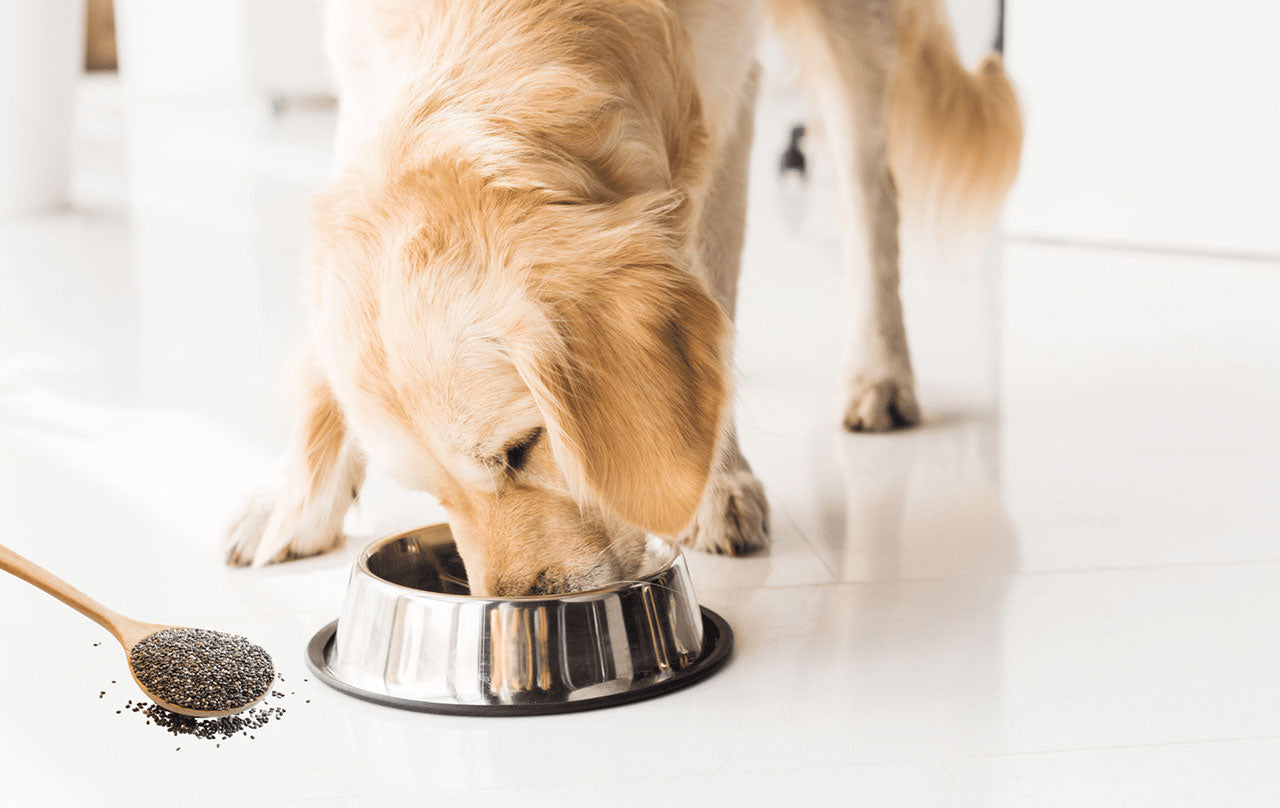There are a number of plant seeds that are gaining in popularity as super seeds. Seeds are a healthy addition to dog food and a good source of grain-free fibre. Chia is one power-packed super seed! These little seeds have an incredible capacity for absorbing water and are best soaked before consuming. This property along with their high fat and fibre content is likely to contribute greatly to a slow absorption rate, resulting in sustained energy release.
Chia seeds are native plants in Mexico and Guatemala. As food, they are incredibly beneficial to humans and often found in health foods for various reasons. Chia seeds offer hydration because of their ability to hold water. They have been known to help reduce blood pressure and increase weight loss by preventing cravings. They are a bulky substance that gives the body a feeling of being full. They are small and don't need to be ground up. They are also easy to digest.
As a health food, we humans may be sold on chia seeds for all the great benefits they offer. But what about your dog? Can your dog have chia seeds too? Could they benefit from the same advantages chia seeds offer to humans?
Benefits of Chia Seeds for Dogs
Chia seeds are packed with omega-3 fatty acids. They offer three times the amount of omega-3 fatty acids as salmon. This may be a good alternative source for dogs that are sensitive to fish and fish oil. Fatty acids for your dog help to promote healthy cells, tip-top skin and coat, movable joints, and brain and eye development growth for younger puppies as well as building your dog's immune system.
And if your dog suffers from arthritis or joint pain, chia seeds and the amount of omega-3 fatty acids found in them offer anti-inflammatory properties as well.
As a great source of fibre, Chia may be a good supplement to add for dogs on a weight-loss regimen. But watch those calories: since chia is rich in fatty acids, a small amount is often enough. Chia seeds are much higher in omega-3 fatty acids than omega-6 and may not be a balanced fatty acid supplement on its own.
Chia seeds have calcium, magnesium, phosphorus, manganese, zinc, vitamins B12 and B3, and potassium. Chia seeds offer more potassium than bananas, more iron than spinach, more antioxidants than blueberries, and more calcium than milk.
Chia seeds are also an excellent source of protein. Though chia seeds will not have as much protein as a meat or animal source, they do contain more protein than any other seed or grain.
Thanks to their slow energy release, dogs with a hearty, constant appetite feel fuller, cutting down on the food they eat and providing crucial support for weight loss in cases of obesity.
How to Give Chia seeds to your Dog
Because of their small size, chia seeds don’t need to be ground down before you use them.
As mentioned, Chia seeds contain phosphorus, iron, zinc, potassium, magnesium, and several vitamins, making them ideal for sprinkling on meals and snacks.
Try adding a teaspoon directly on your dog’s dinner if he eats a moist food, or soak a teaspoon in water or broth and mix with dry food. Always make sure your dog has access to plenty of fresh water after eating chia. Since chia is both fibre- and fat-rich, it’s wise to start with a small amount and test your dog’s tolerance.
Or you can complete their meals with our nutritional Meal Balancing Booster. It contains whole food ingredients like chia seeds, turmeric, psyllium husk, maca and more! Ideal for homemade dog food diets or for those who’d like to add more whole food nutrients to their dried foods. It’s suitable for all dogs. Just add one level teaspoon to each meal (wet/fresh food) for dogs 15kg and under and one tablespoon for dogs over 15kg. If feeding on dry, try mixing with a little of your favourite healthy oil.
If you are looking for an all-natural boost to supplement your dog's diet, Chia seeds might be the most well-rounded superfood you can find. They are affordable, highly nutritious, gluten-free, and completely safe for your dog.


